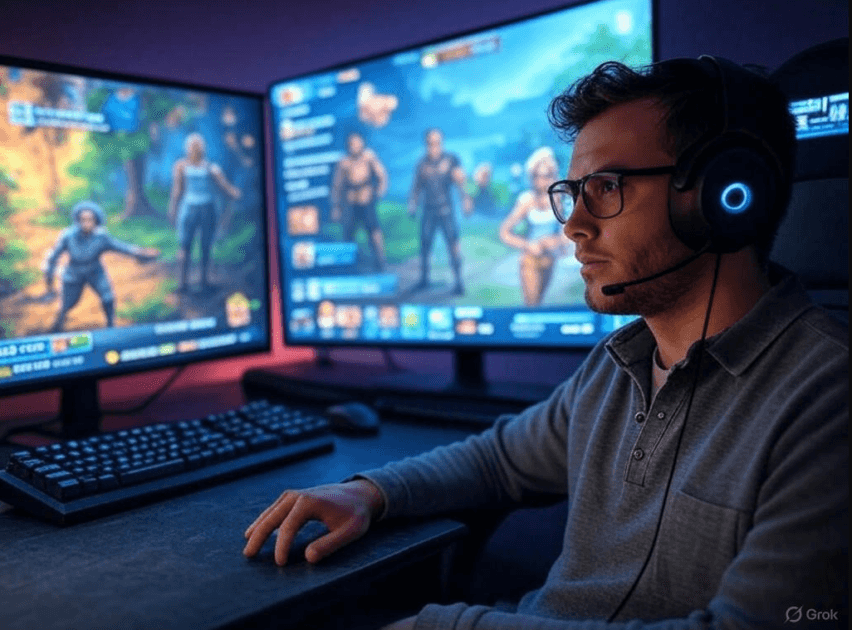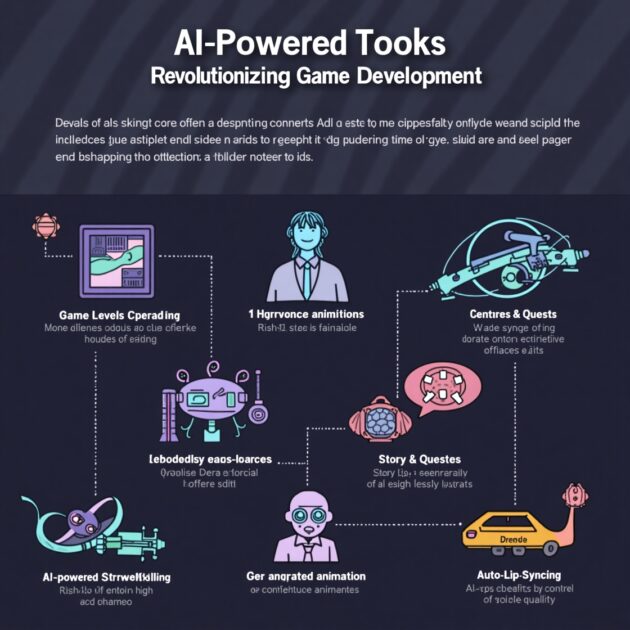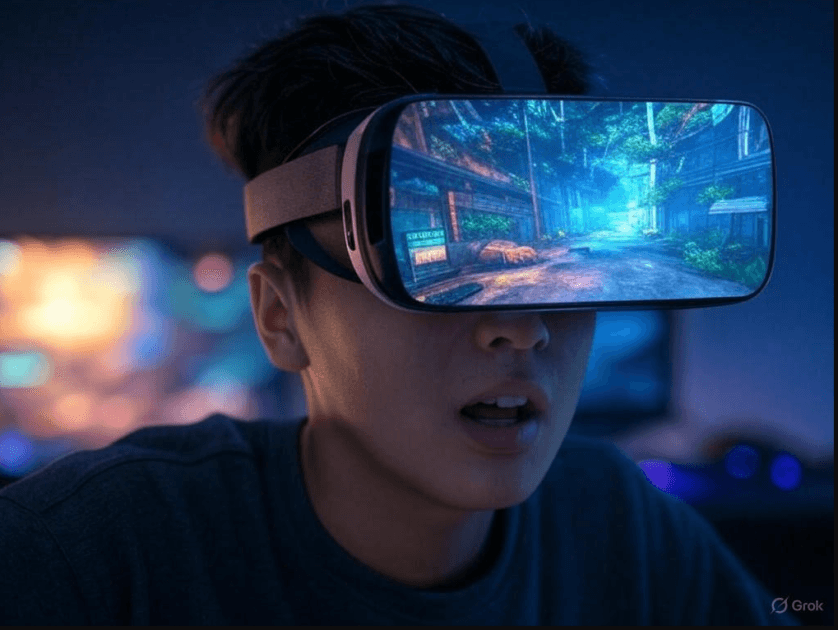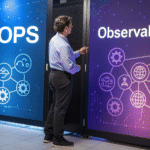AI-Powered Tools Revolutionizing Game Development

AI has introduced various tools that automate and enhance game development, reducing costs and increasing creativity. Here are some of the most impactful applications for AI in Video Game Design:

1. Procedural Content Generation (PCG)
AI enables developers to create vast, dynamic game worlds using Procedural Content Generation (PCG). Instead of manually designing every element, AI algorithms can generate:
- Game Levels & Maps: Games like Minecraft and No Man’s Sky use AI to create infinite worlds, making each player’s experience unique.
- Textures & Assets: Tools like Scenario help generate unique textures, skins, and assets quickly.
- Story & Quests: AI-powered storytelling tools can generate adaptive narratives based on player choices.
✅ Benefits:
- Infinite replayability
- Saves time for developers
- Reduces manual workload
⚠️ Challenges:
- Risk of repetitive or non-engaging content
- Difficult to control quality consistency
2. AI-Generated Art and Animation 🎨
Creating high-quality game visuals takes time, but AI has made it easier with:
- AI-assisted animation: AI-driven tools analyze motion capture data and automate character animations, reducing production time.
- Texture & Character Design: AI tools like Deep Dream Generator and Artbreeder assist in creating unique, high-quality characters and environments.
- Auto-Lip Syncing: AI automates the process of lip-syncing for character dialogues, making cutscenes and voiceovers look more realistic.
✅ Benefits:
- Speeds up the creative process
- Allows small studios to compete with big developers
⚠️ Challenges:
- AI-generated assets may lack the human touch
- Ethical concerns around AI-created art
3. AI in NPC Behavior & Enemy AI 🎭
One of the most exciting AI advancements is in NPCs and enemy behavior:
- Smart NPCs: AI enables NPCs to react dynamically to player actions, making interactions more immersive. The Last of Us Part II uses AI to make enemies communicate and strategize.
- AI-Driven Enemies: AI enhances enemy tactics, as seen in F.E.A.R., where opponents flank, take cover, and respond strategically to players.
- Machine Learning NPCs: Some experimental games feature NPCs that learn from player behavior, adapting to play styles over time.
✅ Benefits:
- More immersive and challenging gameplay
- NPCs act and react naturally
⚠️ Challenges:
- Requires high computational power
- May lead to unexpected bugs
4. AI-Powered Voice and Speech Recognition 🎤
Voice synthesis and recognition in gaming have improved significantly, allowing for:
- Natural Language Processing (NLP): Games like The Elder Scrolls V: Skyrim have implemented voice commands for more interactive gameplay.
- Text-to-Speech NPCs: AI-generated voices eliminate the need for extensive voice-acting sessions while still delivering realistic dialogue.
- Voice-Controlled Gameplay: Some games now allow players to control actions using voice commands.
✅ Benefits:
- Saves costs on hiring voice actors
- Allows for dynamic and adaptive conversations
⚠️ Challenges:
- May lack emotional depth
- Potential job loss for human voice actors
5. AI for Game Conceptualization & Development
AI tools help designers conceptualize and structure their games efficiently:
- Game Design Assistance: Platforms like Ludo.ai offer AI-driven suggestions for mechanics, narratives, and characters.
- Code Generation & Debugging: AI-powered engines like OpenAI’s Codex assist developers in writing and debugging game code faster.
✅ Benefits:
- Faster debugging process
- Reduces human testing costs
⚠️ Challenges:
- AI may overlook creative or user experience-based issues
- High initial investment for AI-driven testing tools

🔄 Enhancing Gameplay with AI
AI is not just about development; it also makes games more engaging, dynamic, and personalized.
1. Personalized Gaming Experience
AI can analyze player behavior and adapt the game accordingly. Features include:
- Dynamic Difficulty Adjustment (DDA): AI adjusts game difficulty based on player skill. Example: Resident Evil 4 modifies enemy aggression and resources based on player performance.
- AI-Driven Storytelling: Games like Detroit: Become Human adjust the storyline based on player choices using AI-driven branching narratives.
- Real-Time Adaptation: AI in Left 4 Dead monitors player progress and spawns enemies or resources accordingly.
2. AI for Game Optimization
AI-powered assistants help optimize gaming performance:
- AI in Graphics Optimization: Nvidia’s DLSS (Deep Learning Super Sampling) boosts frame rates while maintaining image quality.
- Automated Bug Detection: AI tools scan for and fix bugs, reducing debugging time.
- AI-Assisted Game Balancing: AI analyzes in-game data to ensure fair multiplayer experiences.
📈 Pros and Cons of AI in Game Development
Benefits of AI in Gaming
🏆 Efficiency: AI automates repetitive tasks, speeding up development timelines.
🔧 Creativity: AI tools inspire new game ideas and enhance artistic expression.
💎 Cost Reduction: Automating processes reduces production expenses.
📝 Improved Gameplay: AI-driven mechanics make games more immersive and adaptive.
⚠️ Challenges and Concerns
📉 Quality Control: Overuse of AI-generated assets can result in inconsistencies.
💡 Job Displacement: Automation may reduce the demand for human developers in certain areas.
💼 Ethical and Legal Issues: AI-generated content raises concerns about copyright and originality.
🎯 Trusted AI Tools for Game Development
For developers looking to integrate AI into their workflows, here are some reliable tools:
- Scenario – AI-powered asset and texture generation.
- Ludo.ai – AI-driven game conceptualization and ideation.
- Promethean AI – Assists in environment and world-building.
- Incredibuild – AI-based performance optimization.
- Nvidia G-Assist – AI-driven game optimization.
🌟 The Future of AI in Video Games
AI is set to play an even bigger role in gaming, enhancing realism, personalization, and development efficiency. As technology advances, AI-driven tools will continue to push the boundaries of creativity, making video games more immersive than ever before.
Embracing AI in game design isn’t just about efficiency—it’s about unlocking new creative possibilities and shaping the future of interactive entertainment.

Frequently Asked Questions (FAQ):
How is AI used in game development?
Answer : AI automates asset creation, enhances NPC behavior, and optimizes gameplay mechanics.
Can AI create entire games independently?
Answer : While AI can assist in development, human creativity is still crucial for designing engaging experiences.
Are AI-generated assets copyright-free?
Answer : The legality of AI-generated content varies, so developers should check copyright laws before use.
Will AI replace human game developers?
Answer : No, AI complements human creativity rather than replacing it entirely.
How can I start using AI in game development?
Answer : Explore AI tools like Scenario and Ludo.ai, which offer intuitive integration options.



